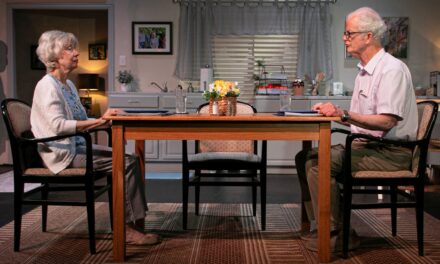Wearing a black canvas of a skirt animated with neon green and orange marigolds, Shana Tucker eagerly and confidently took command of UNCG’s Tew Recital Hall. After the thunderous applause welcoming her to the spotlight, Tucker took a moment of repose. Without a word of preface, she began her set with an intimate, unaccompanied rendition of the Black national anthem, “Lift Every Voice and Sing.” Instead of overtly reiterating the context of her Blackness to a majority white audience, Tucker let the music speak for itself with the same reverence expected during “The Star-Spangled Banner.” With the repeated direction, “Rise!,” Tucker signaled that the evening would be a personal, triumphant, and adamantly joyous musical program.
Tucker is a musician in her own league of innovation. Her trademarked genre of ChamberSoul™ is a fusion of jazz, roots folk, acoustic pop, and a touch of R&B. To be honest, I was a little skeptical going in, wondering just how original something like ChamberSoul™ could actually sound. It was Tucker’s unique style of singing and cello playing that realized the genre. Her voice has the belting power of pop singer, tasteful restraint befitting the jazz greats, freeness and rawness, and a rich core of tone directed right at the audience. It would be easy to say that Tucker’s cello playing was vocal as well but it was so much more nuanced than that; it sounded specifically like her own voice. She displayed the same control of tension and release, the same natural variations in intonation, and an articulation of lyricism true to the very words of melodies she had just sung.
Following on the heels of “Lift Every Voice,” Tucker’s band joined her onstage and forged ahead with a cover of “Pure Imagination.” As if in response to the previous number, Tucker and her ensemble painted the picture of a world free of limitations. Living through the truth of the lyrics, Tucker reveled in the duality of her artistry as self-fulfilling and as a performer eager to share with listeners. One moment she had her back turned to us to bask in her collaborator’s piano solo and the next she was making direct eye contact with audience members. With the band leading the sound, Tucker deftly fiddled with a mixing set on stage, singing quietly, mostly inaudible. As the ensemble receded, Tucker’s creation, a looped amalgamation of her voice in dreamy harmony and countermelody, engulfed the hall.
With the audience completely wrapped around her finger, Tucker switched gears before her next number. Playfully commenting on the conventions of classical music consumption, Tucker engaged the audience, “y’all are so…respectful” and observed how the formality of the space was contributing to our silence. Throughout the evening, Tucker continued to pull us up out of our seats and onto the stage; her infectiously bright personality was irresistible. Even more inviting was the ongoing interplay between Tucker and her bandmates on stage. Frequently stealing the mic and injecting Tucker’s commentary with jokes and asides, pianist Christian Tamburr was as much a personality on stage as Tucker herself. At one point towards the end of the show, after plenty of joking on display, Tucker said to the audience, “Thank you so much for tolerating our foolishness.” If anything, the lively nature of the group contributed to the organic storytelling of their set as much as the music did. There were times when the improvisation and spontaneity wove seamlessly together with rehearsed transitions, creating a multi-sensational show. In her final remark before returning to the set, she told us that her music is “of the people, for the people, and by the people.”
Playfulness and personal experience pervaded the rest of the night. Tucker pulled out a number of original compositions like the uplifting “Shine,” the love song “Fast Lane,” and the breakup song “November.” Among her works, most striking was Tucker’s looping and mixing abilities on “Gazelle.” As Tucker put it that evening, “Gazelle” is about truth, honesty with yourself about what you’re capable of in a relationship, and knowing when and why separation can sometimes be necessary. Expanding on the feelings surrounding her ongoing divorce in “No Getting Back,” Tucker shared the spotlight with bassists and UNCG alumni Butler Knowles who pulled out the most disrespectful bass solo I’ve ever heard.
The most profound number on the entire program was Tucker’s art-song style cover of a piece by Gabriel Kahane titled “What if I Told You.” A telling narrative about life in the South as person of color (especially a Black woman), the refrain “They don’t need a hood, or a cross, or a tree” struck a tone with the audience. After so much vibrancy and engagement, we were starkly reminded of the ongoing violence against Black people in America. Much like her opening performance, Tucker let the lyrics speak for themselves, providing the unspoken context and severity the audience needed to hear, and then returning to a focus on the joy of life.
Tucker dedicated her final piece, “Overjoyed,” to the audience at large and her “future artist colleagues of the world” in the audience that evening. Ravishingly human, her performance was inspiring, challenging, and deeply intimate. In some of her final words of the night, Tucker shared with us that “to be human is to be creative” and that we should pursue our creativity without inhibitions. As a musician myself, I left the venue with the motivation to be as artistically free as Shana Tucker.











